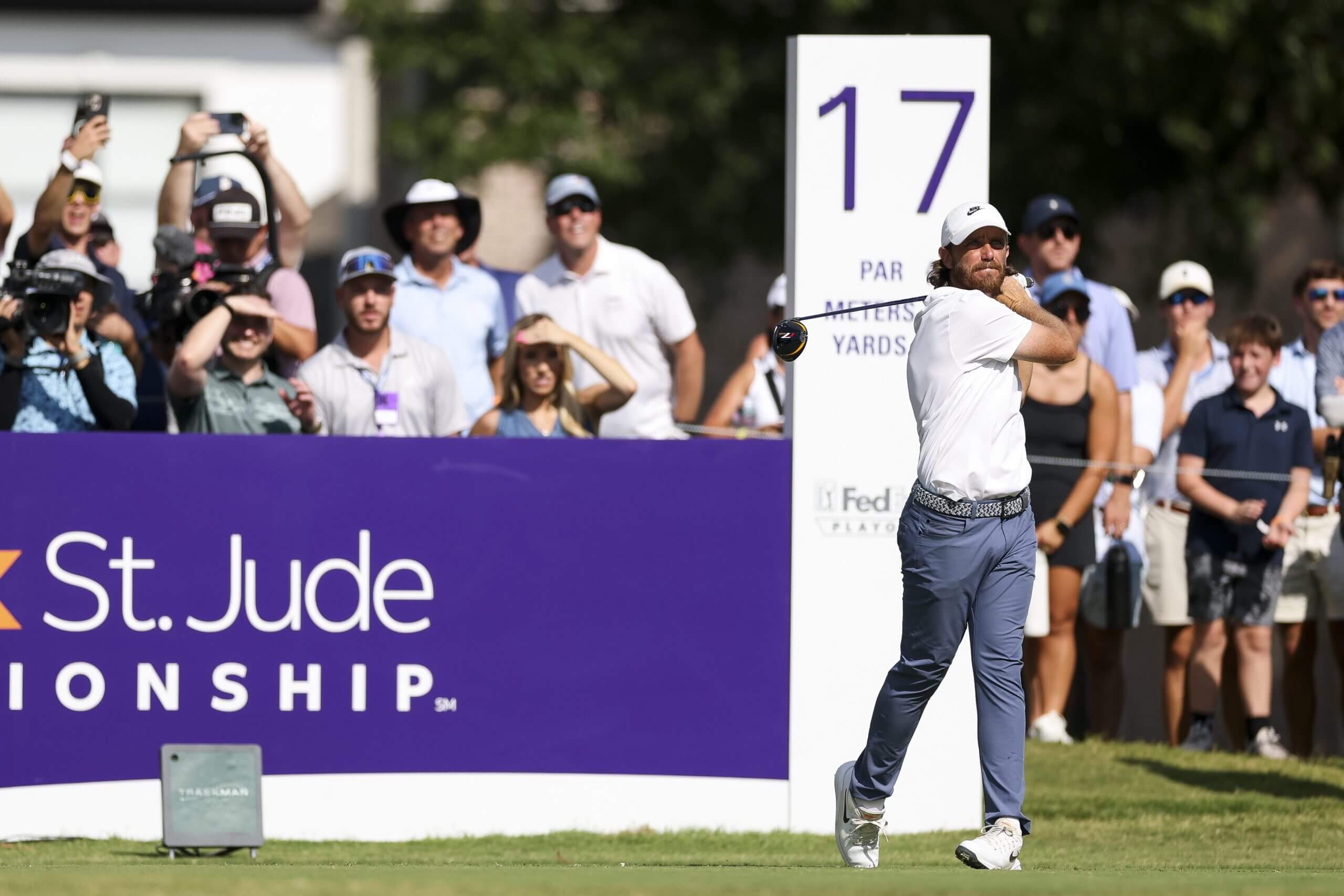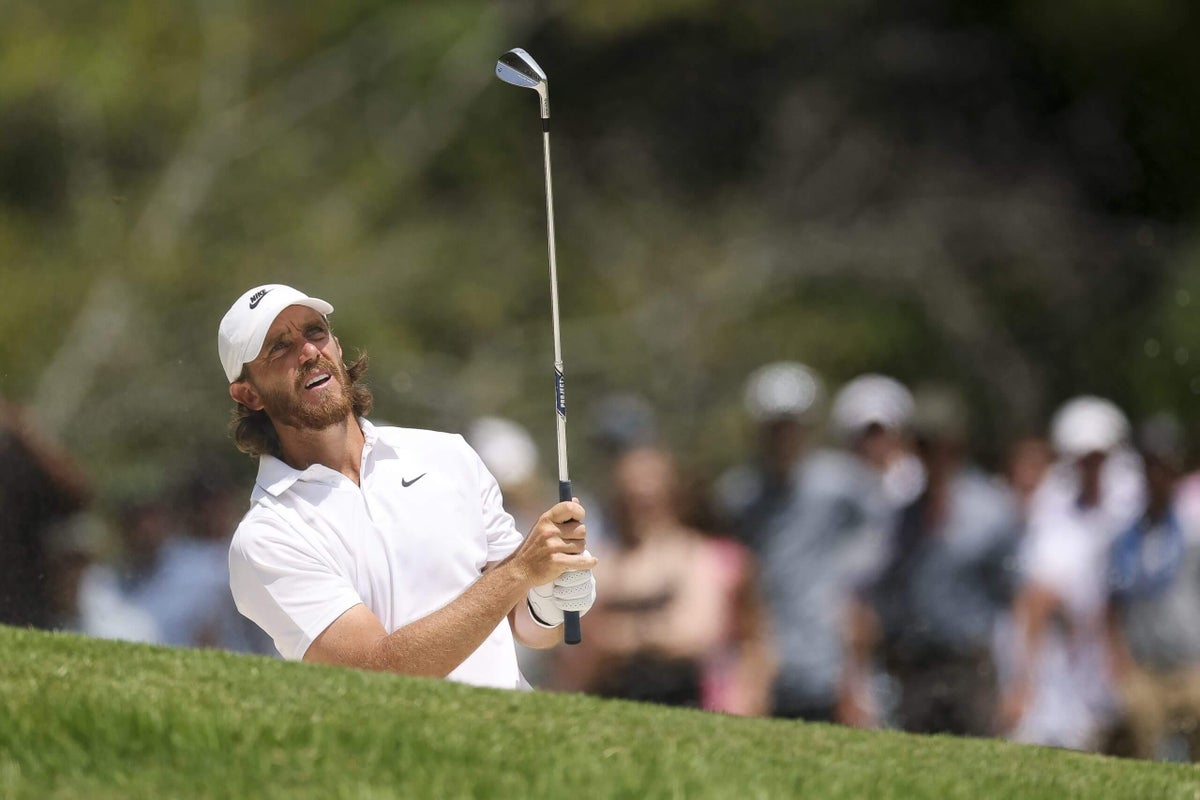Tommy Fleetwood knows what questions are coming. He answers them with grace. He even manages to crack a smile. The 34-year-old Englishman has been here before — he has a deep memory log of the rituals that come with a near-miss.
“As disappointed as I am, I have to try to find the strength to make it all a positive experience,” Fleetwood said after beginning Sunday’s St. Jude Championship final round with the lead, and ending it a shot out of a playoff.
Fleetwood is far and away the best player without a win on the PGA Tour, maybe ever. This will be his reality until it isn’t anymore.
The latest close-call for Fleetwood came in Memphis, at the start of the FedEx Cup playoffs. Justin Rose won in a playoff, but just as notable from the tournament was how Fleetwood let it slip from his grasp. With a two-shot lead heading into the 16th hole at TPC Southwind, Fleetwood played the final three holes in 1-over par. He parred the easily scoreable par-5 16th. Then he bogeyed the par-4 17th, failing to save par from 7 feet. Fleetwood missed the cup entirely, and he walked toward the hole as if he knew his fate before the putter even struck the ball. Suddenly playing from behind, he hit his drive on 18 into a fairway bunker, ending his best shot at getting the birdie he needed to force himself into the playoff with Rose and J.J. Spaun.
“All these experiences and these close calls, there’s no point in making or allowing them to have a negative effect on what happens next. What would be the point?” Fleetwood told reporters. “I did a ton of good stuff.”
Fleetwood’s sports psychologist, Bob Rotella, echoed those comments in a text message to The Athletic: “He is playing lots of great golf, looking for some wins while loving being in contention a lot. He’s focusing on all the positives until it happens.”
We’ll never know what Fleetwood is truly thinking, but this is what he’s saying: Yes, the disappointments do start to add up. So do his attempts to move on from them.
“I just look forward to the opportunities and continue to give myself a chance in chasing my dreams.”
Tommy Fleetwood arrives to TPC Southwind with a positive attitude in search of his first TOUR win. pic.twitter.com/CLCPyiW8Y7
— PGA TOUR (@PGATOUR) August 10, 2025
Suppose performance psychology research can add to what we already know. In that case, it’s that facing the lingering thoughts of those repeated close-calls prompts a uniquely human response — with an oftentimes unfortunate result. The more we try to prevent an unwanted outcome, the harder it is to pursue what we want to achieve freely.
It’s not as if Fleetwood hasn’t won golf tournaments and doesn’t have the skill required to outlast the best players on the PGA Tour. He has seven victories in Europe. He’s the No. 4-ranked player on DataGolf.com and a top-10 ballstriker in the world. It’s the final moments — the closing stretch en route to a PGA Tour trophy — that has proven to be Fleetwood’s Achilles’ heel. Fleetwood has 29 top-5 finishes on the PGA Tour, including at all four majors. According to The Athletic contributor Justin Ray, that’s 11 more top-5s than any other player without a PGA Tour win over the last 40 years.
One of those finishes came just last month at the Travelers Championship, where Fleetwood stumbled late and lost to Keegan Bradley. In that event, Fleetwood shot 66-65-63-72. This weekend, he shot 63-64-69-69. In both final rounds, Fleetwood opened with a bogey.
Davis Love III won 21 times on the PGA Tour, but he also finished second 30 other times, No. 17 on the tour’s all-time list. Love, now 61, is aware of that statistic. Reflecting on Fleetwood’s most recent close-call, the major champion recalls that more of his victories on the PGA Tour resulted from come-from-behind surges than sleeping on a 54-hole lead.
“When (Fleetwood) bogeys the first hole, what’s the first thought that’s going to pop into your head? It’s ‘Oh no. Here we go again,’” Love says. “It’s not a golf swing or golf mechanics issue. It’s just a mental thing.”
Love, who also worked with Rotella throughout his career, can relate to Fleetwood’s pursuit — all golfers can, at varying degrees.
“Everybody has the same problem. It’s expectations,” Love says. “It doesn’t matter if you’re trying to get your card or your FedEx Cup points to make the top 50, or you’re Tiger Woods trying to win your 100th tournament. It’s a mental battle to not play for something other than one shot at a time.”
Every time Fleetwood gets into contention, he’s battling the challenge of his own tournament history. The headlines, the statistics — the frenzy is impossible to ignore, and every time it happens again, the task can feel more difficult, as Fleetwood admitted on Saturday evening, knowing he’d begin the next day with Rose, Scottie Scheffler and Spaun right behind him, chasing.
“I would way rather be there and fail than not be there at all. So either way, it’s a good thing. Yeah, it hurts when it doesn’t happen for you and that sort of streak — people talk about it more and more that goes on,” Fleetwood said.

Fleetwood’s bogey on 17 took him out of the lead in Memphis. (Andy Lyons / Getty Images)
When a cycle like this emerges, it can often be traced to a player attempting to prevent their past failures from playing out again in the future. Raymond Prior, a performance psychologist who has worked with multiple major champions, likens this to sinking in quicksand. The more you try to flail around, trying to stop the worst-case scenario from playing out, the easier it is to get swallowed up.
An athlete’s brain naturally strives to protect itself from repeated failure in a high-pressure environment. If a golfer tells himself he absolutely cannot lose a tournament again, it’s likely he will begin to operate with anxiety — this is how the brain was designed to warn us of potential hurt or danger.
Prior once worked with a player who played in the final pairing on Sunday nine times throughout a single golf season. He lost every time. “What was behind the anxiety was trying at all costs to avoid the same experience: Trying and failing and being the player who can’t close.” Prior says.
Whereas another player fought the same cycle, but worried if they finally won, they might not be able to win again. “In this case, playing through anxiety protected the player from having to deal with what comes with trying. And perhaps not being able to maintain success,” Prior continued.
These anxieties can stem from varying sources, but only Fleetwood knows his inner experience.
For the Englishman, the swing is there. The skills are undeniable, and the close-calls indicate a level of elite play that other players work lifetimes to achieve. His future will be about acceptance, awareness and figuring out how to face his internal status quo — whatever that may be — head on.
(Top photo: Andy Lyons / Getty Images)







